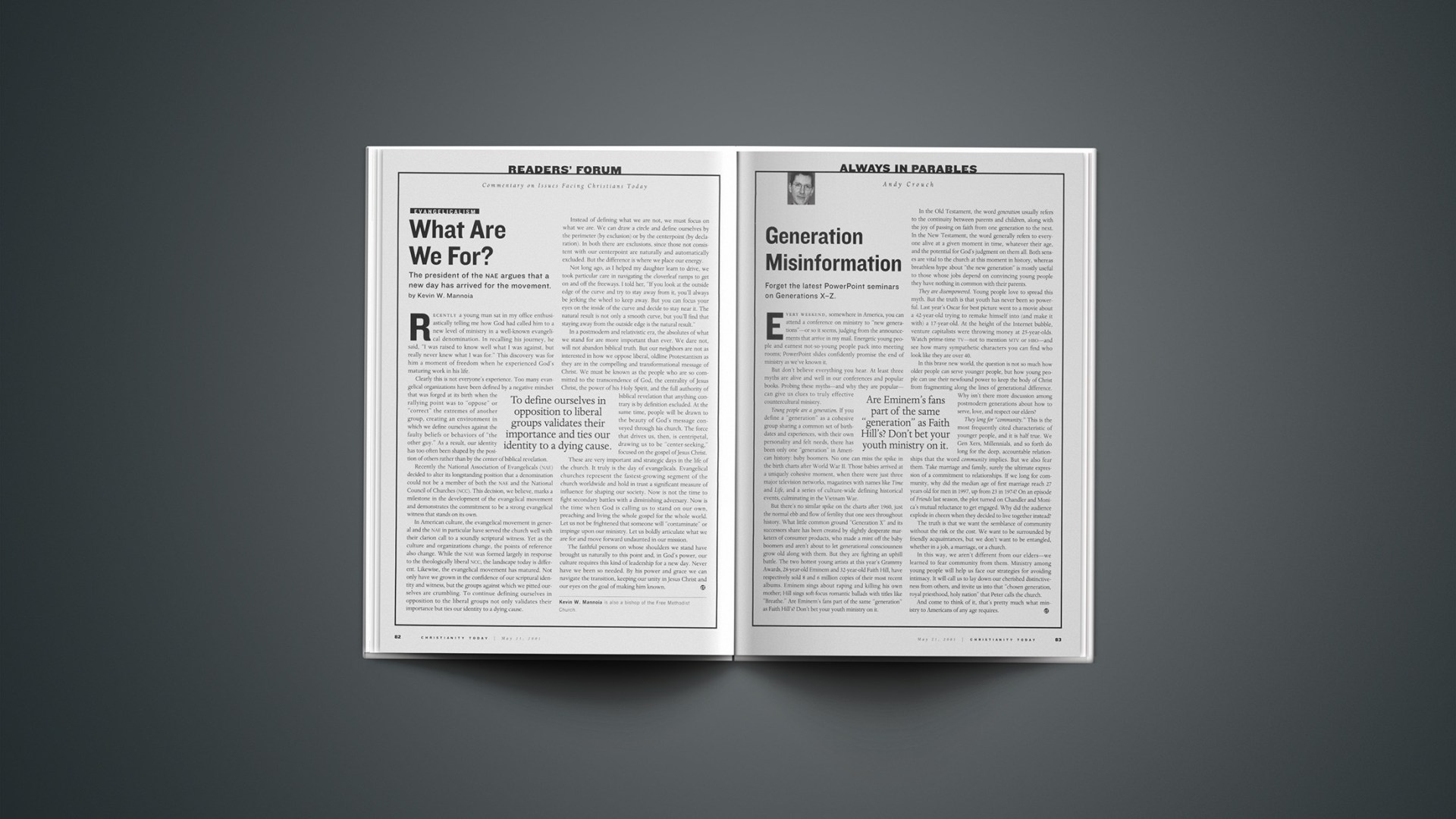But don’t believe everything you hear. At least three myths are alive and well in our conferences and popular books. Probing these myths—and why they are popular—can give us clues to truly effective countercultural ministry.
Young people are a generation. If you define a “generation” as a cohesive group sharing a common set of birthdates and experiences, with their own personality and felt needs, there has been only one “generation” in American history: baby boomers. No one can miss the spike in the birth charts after World War II. Those babies arrived at a uniquely cohesive moment, when there were just three major television networks, magazines with names like Time and Life, and a series of culture-wide defining historical events, culminating in the Vietnam War.
But there’s no similar spike on the charts after 1960, just the normal ebb and flow of fertility that one sees throughout history. What little common ground “Generation X” and its successors share has been created by slightly desperate marketers of consumer products, who made a mint off the baby boomers and aren’t about to let generational consciousness grow old along with them. But they are fighting an uphill battle. The two hottest young artists at this year’s Grammy Awards, 28-year-old Eminem and 32-year-old Faith Hill, have respectively sold 8 and 6 million copies of their most recent albums. Eminem sings about raping and killing his own mother; Hill sings soft-focus romantic ballads with titles like “Breathe.” Are Eminem’s fans part of the same “generation” as Faith Hill’s? Don’t bet your youth ministry on it.
In the Old Testament, the word generation usually refers to the continuity between parents and children, along with the joy of passing on faith from one generation to the next. In the New Testament, the word generally refers to everyone alive at a given moment in time, whatever their age, and the potential for God’s judgment on them all. Both senses are vital to the church at this moment in history, whereas breathless hype about “the new generation” is mostly useful to those whose jobs depend on convincing young people they have nothing in common with their parents.
They are disempowered. Young people love to spread this myth. But the truth is that youth has never been so powerful. Last year’s Oscar for best picture went to a movie about a 42-year-old trying to remake himself into (and make it with) a 17-year-old. At the height of the Internet bubble, venture capitalists were throwing money at 25-year-olds. Watch prime-time TV—not to mention MTV or HBO—and see how many sympathetic characters you can find who look like they are over 40.
In this brave new world, the question is not so much how older people can serve younger people, but how young people can use their newfound power to keep the body of Christ from fragmenting along the lines of generational difference. Why isn’t there more discussion among postmodern generations about how to serve, love, and respect our elders?
They long for “community.” This is the most frequently cited characteristic of younger people, and it is half true. We Gen Xers, Millennials, and so forth do long for the deep, accountable relationships that the word community implies. But we also fear them. Take marriage and family, surely the ultimate expression of a commitment to relationships. If we long for community, why did the median age of first marriage reach 27 years old for men in 1997, up from 23 in 1974? On an episode of Friends last season, the plot turned on Chandler and Monica’s mutual reluctance to get engaged. Why did the audience explode in cheers when they decided to live together instead?
The truth is that we want the semblance of community without the risk or the cost. We want to be surrounded by friendly acquaintances, but we don’t want to be entangled, whether in a job, a marriage, or a church.
In this way, we aren’t different from our elders—we learned to fear community from them. Ministry among young people will help us face our strategies for avoiding intimacy. It will call us to lay down our cherished distinctiveness from others, and invite us into that “chosen generation, royal priesthood, holy nation” that Peter calls the church.
And come to think of it, that’s pretty much what ministry to Americans of any age requires.
Copyright © 2001 Christianity Today. Click for reprint information.
re:generation quarterly, the magazine Andy Crouch edits, focused on “Rethinking Generationally-Based Ministry” in its Fall 1999 issue. Among the articles in that issue were Crouch’s “For People Like Me: The Myth of Generations,” and “The Evolution of Gen X Ministry” by Dieter and Valerie Zander.
Crouch also reviewedJesus for a New Generation by Kevin Graham Ford for an earlier issue of re:generation quarterly before he became editor, and reflected “on the deficits bequeathed to his generation and on its fear of redemption” for a 1996 issue of Christianity Today.
In February, Crouch presented a talk on “The Genealogy of Generation” (HTML here and here, also as a PDF file) for the Boston Theological Institute’s Costas Consultation on Mission.
The Spring 1999 issue of Leadership Journal, Christianity Today sister publication for pastors, included the debate, “Should the Church Target Generations?“
Earlier Andy Crouch columns for Christianity Today include:
Dead Authors Society | We’re no longer interested in tasting death but only little morsels of cheer. (Mar. 28, 2001)
Promises, Promises | Our technology works. But all idols do at first. (Feb. 21, 2001)
A Testimony in Reverse | I have discovered how inconvenient it can be when God actually does speak. (Feb. 5, 2001)
Crunching the Numbers | A modest proposal for measuring what really matters in church life. (Dec. 20, 2000)
Many of Crouch’s other writings are available at his and his wife’s Web site.










